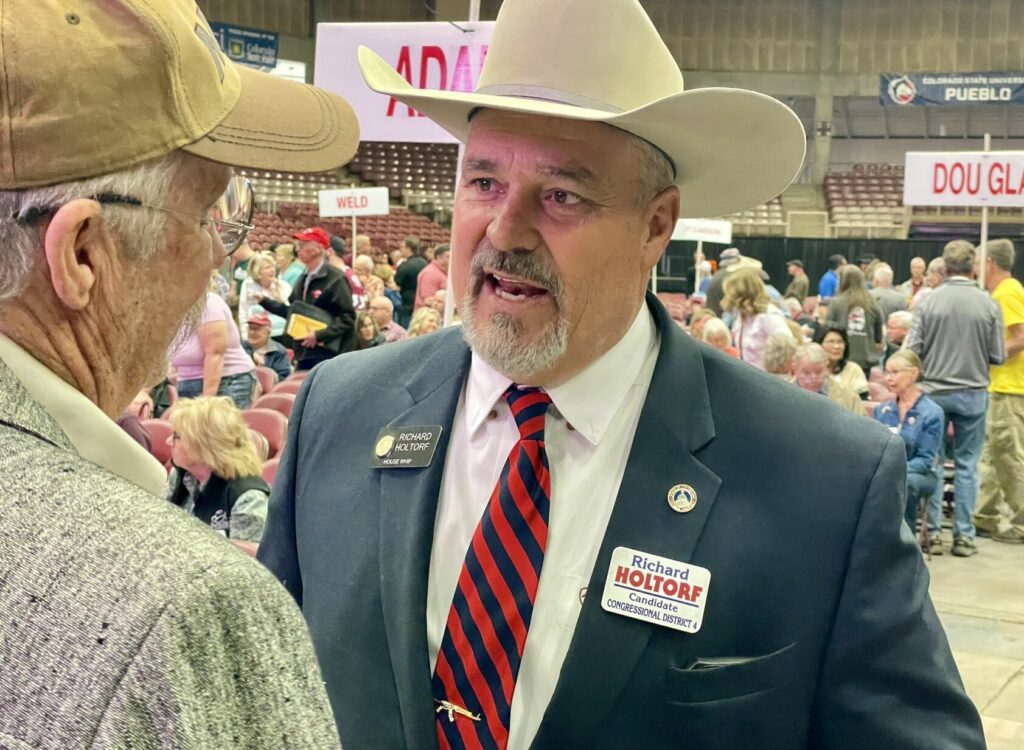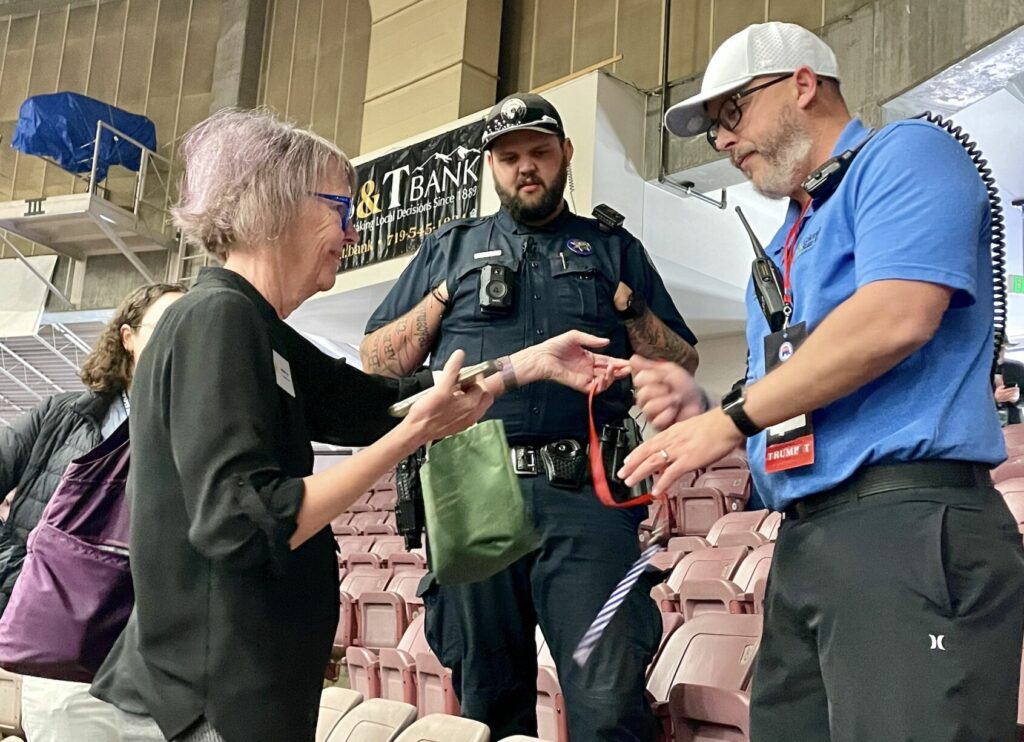In top-ticket Colorado races, rematches only rarely flip election results | TRAIL MIX

Earlier this week, the Colorado Republican who lost one of last year’s closest congressional races announced that she was passing on another run for the seat.
State Sen. Barb Kirkmeyer declared that she plans to seek another term in the legislature – her Weld County-based seat is up in 2024. She’ll run for that seat rather than seek a rematch with U.S. Rep. Yadira Caraveo, the Thornton Democrat who barely edged past Kirkmeyer to win Colorado’s newest congressional district, the evenly divided 8th CD in Adams, Weld and Larimer counties.
After falling less than a percentage point short – Kirkmeyer trailed Caraveo by just over 1,600 votes, for a 0.69% margin – Kirkmeyer has been facing calls to give it one more try.
Repeat candidates for major office, especially those who kept it close, can come with built-in advantages over fresh faces. Those usually include higher name ID, a seasoned campaign team, a proven list of donors and experience navigating the rocky shoals of a modern campaign.
Kirkmeyer says she gave it “careful consideration and deliberation” but ultimately decided to run for reelection to the legislature, where she’s become one of the most effective voices of the opposition at the statehouse.
There’s no shortage of potential candidates for the GOP nomination in the battleground district, though only one has made it official so far. Almost immediately after Kirkmeyer made her intentions known, Weld County Commissioner Scott James threw his hat in the ring. Another half dozen or so Republicans – including current and former county and legislative officials – are mullling bids.
After coming down to the wire last time, the district is expected to be home to one of the hardest-fought congressional races in the country next year, drawing millions in outside spending for whoever wins the chance to challenge Caraveo, who will likewise have plenty of resources.
On the other side of the state, the Democratic candidate who lost an even closer congressional race last cycle took the opposite tack from Kirkmeyer, declaring just weeks after conceding defeat that he wanted a rematch.
Adam Frisch, a former Aspen city councilman, failed to unseat Republican U.S. Rep. Lauren Boebert in Colorado’s 3rd Congressional District by just 546 votes, for a margin of 0.16%, close enough to compel a recount and inspire the also-ran to run again.
It helps that Boebert is one of the most prominent members of the MAGA wing of House Republicans, hardly going a day lately without landing in the news, energizing fans and foes alike.
At this point, Frisch faces only nominal opposition for the nomination, and while a couple of other Democrats are rumored to be considering getting in the race, the repeat candidate’s eye-popping fundraising totals could scare off most serious competitors. Bolstered by the ability to pitch himself as the one who came this close to unseating Boebert, against all odds, Frisch plans to report raising $2.6 million for the most recent quarter, bringing his total haul since declaring his second campaign to $4.4 million – a record-setting sum in an off-year.
Frisch has plenty of company nationwide this cycle, as the analysts at Sabato’s Crystal Ball point out.
“Retreads abound in House races,” reads the headline in the July 13 edition of the nonpartisan election experts’ Notes on the State of Politics.
“A theme of recent House reporting has been a flood of unsuccessful 2022 candidates coming back for more in 2024,” report J. Miles Coleman and Kyle Kondik, who note that just this week eight House candidates who lost last cycle have declared that they’re back in the saddle and want another chance at the office that eluded them last time around.
It isn’t an uncommon phenomenon, Coleman and Kondik note, adding that repeat candidates arguably provided the edge that won Republicans the majority in the House in the last election.
Since both the GOP’s current House majority and the one enjoyed by Democrats in the last Congress have been “razor-thin,” they observe, “all of these candidate choices are magnified, because it’s not impossible that a single blown race could decide the majority.” That could encourage both parties to court candidates they know over ones they don’t – “at least when the known is not known to be weak.”
The same climate, they add, could also motivate candidates to run again if they’re confident they can correct errors and seize opportunities they missed last time – with the added possibility that they might wind up in the majority.
If he pulls it off, Frisch will join one of the most sparsely populated categories of Colorado politicians: those who successfully turned the tables and won in a rematch.
Rematches have been rare in Colorado’s modern political era. Across every election for top federal and statewide office since the 1970s, only one candidate who lost the first time around has managed to come out on top in a do-over.
That candidate was Scott Tipton, the Cortez Republican who cut his political teeth in the legislature before losing and then winning races in the same 3rd CD Boebert currently represents.
Tipton tried to depose U.S. Rep. John Salazar in the San Luis Valley Democrat’s first run for reelection in 2006 but went down hard, losing by 25 percentage points in a year that favored Democrats. Four years later, however, buffeted by the 2010 Republican wave – fueled largely by a slow economy and a backlash to the Affordable Care Act – Tipton unseated Salazar by just under 5 percentage points.
After easily winning reelection four times, in 2020 Tipton was surprised in the GOP primary by a long-shot, first-time candidate named Lauren Boebert, who is seeking her third term next year.
Plenty of candidates for top-tier Colorado offices tried to accomplish what Tipton achieved, but fell short in their subsequent attempts. Among them are Republican Ed Scott, who ran against Democratic U.S. Rep. Tim Wirth twice, in 1976 and 1978, but lost both times; Democrat Tom Strickland, who went up against Republican Wayne Allard twice for the U.S. Senate, in 1996 and 2002, winning neither time; Republican Casper Stockham, who challenged Democratic U.S. Rep. Diana DeGette in 2016 and 2018, losing by wide margins; and Democrat Ike McCorkle, who failed to unseat Republican U.S. Rep. Ken Buck twice, in 2018 and 2020.
A couple of politicians have been the major party nominee for the same top office more than once but lost, though they faced different opponents each time. Those include Republican Bob Beauprez, a former congressman, who ran for governor twice, in 2006 and 2014, losing the first time to Bill Ritter and the second time to John Hickenlooper. Democrat Diane Mitsch Bush ran unsuccessfully against Tipton in 2018 and Boebert in 2020.
In addition to his singular distinction of coming back from a loss to win a rematch, Tipton is also one of only a handful of Coloradans in the modern era who both deposed a congressional incumbent and later lost their own bids for reelection.
Since the 1970s, his compatriots in that category include Democrat Floyd Haskell, who beat an incumbent GOP U.S. senator in 1972 only to lose to another Republican six years later; Democrat Betsy Markey, who removed a Republican from the 4th Congressional District seat in 2008 but lost her bid for reelection two years later to Republican Cory Gardner; and Gardner, who beat Democratic U.S. Sen. Mark Udall in 2014 but lost his campaign for a second term to Democrat John Hickenlooper in 2020.
Colorado candidates for major statewide and congressional offices have been more successful at pulling off the rematch’s cousin, the rebound.
Buck, the Republican who is serving his fifth term in Congress, bounced back from a narrow loss to Democrat Michael Bennet in the 2010 U.S. Senate race to win the 4th Congressional District seat left open by Gardner in 2014. He’s won reelection by wide margins since.
Democrat Roy Romer, however, might have set the bar for Colorado comebacks.
The former state lawmaker from Holly lost a run for the U.S. Senate by a wide margin in 1966 to Republican incumbent Gordon Allott, but just over a decade later Romer was appointed state treasurer after Democrat Sam Brown resigned midterm. Romer won reelection twice as treasurer and then went on to be elected to three terms as governor, becoming the last Coloradan to serve more than two terms in that office, before term limits were established.
Ernest Luning has covered politics for Colorado Politics and its predecessor publication, The Colorado Statesman, since 2009. He’s analyzed the exploits, foibles and history of state campaigns and politicians since 2018 in the weekly Trail Mix column.














